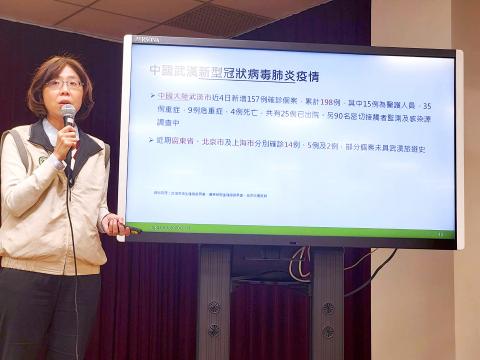Taiwan yesterday reported its first confirmed case of a new type of coronavirus — a 55-year-old Taiwanese woman who arrived on Monday from China.
The woman, who works in the Chinese city of Wuhan, where the virus was first discovered, reported to quarantine officials at Taiwan Taoyuan International Airport that she had a fever, the epidemic response command center said.
The center was established on Monday to contain the spread of the new coronavirus.

Photo: Lin Hui-chin, Taipei Times
The woman was immediately placed in quarantine and later tested positive for the pneumonia-like virus, dubbed the 2019 novel coronavirus (2019-nCoV), the center said.
The Centers for Disease Control (CDC) said that travelers, regardless of nationality, who have recently been to China and are found to have “pneumonia-like symptoms,” would now be subject to compulsory quarantine.
The CDC said that while those with the coronavirus might not develop a fever, the measure in practice would still depend on monitoring the temperatures of inbound travelers when they arrive at airports and seaports across the nation.
Travelers with a fever would then be asked about their travel history and be checked by a doctor if the situation warrants, CDC Deputy Director-General Chuang Jen-hsiang (莊人祥) said.
Those found to have pneumonia-like symptoms, such as shortness of breath and low blood-oxygen levels, and who have been in China in the previous 14 days, would be placed in compulsory quarantine, he said, adding that additional medical workers have been posted at the nation’s international gateways to support the measure.
Previously, people were only quarantined if they developed pneumonia-like symptoms and had been to Wuhan.
Those who have the aforementioned symptoms and have been to China, but failed to report their conditions to health authorities could face a fine of up to NT$150,000 for breaching the Communicable Disease Control Act (傳染病防治法), the CDC said.
The CDC will soon have brochures distributed on flights from China, Hong Kong and Macau to alert inbound travelers about the seriousness of the disease, Chuang said.
The brochures are to remind travelers to monitor their health and report to the authorities if they develop pneumonia-like symptoms, or face a fine.
The CDC reiterated its appeal to Taiwanese traveling in China to wear surgical masks and avoid contact with animals, animal markets and patients with acute respiratory syndrome.
People who develop a fever, acute cough or other respiratory symptoms within 14 days after returning from China should contact the CDC via its 1922 hotline, or 0800-001-922, wear a surgical mask and seek immediate medical attention.

NATIONAL SECURITY THREAT: An official said that Guan Guan’s comments had gone beyond the threshold of free speech, as she advocated for the destruction of the ROC China-born media influencer Guan Guan’s (關關) residency permit has been revoked for repeatedly posting pro-China content that threatens national security, the National Immigration Agency said yesterday. Guan Guan has said many controversial things in her videos posted to Douyin (抖音), including “the red flag will soon be painted all over Taiwan” and “Taiwan is an inseparable part of China,” while expressing hope for expedited “reunification.” The agency received multiple reports alleging that Guan Guan had advocated for armed reunification last year. After investigating, the agency last month issued a notice requiring her to appear and account for her actions. Guan Guan appeared as required,

A strong cold air mass is expected to arrive tonight, bringing a change in weather and a drop in temperature, the Central Weather Administration (CWA) said. The coldest time would be early on Thursday morning, with temperatures in some areas dipping as low as 8°C, it said. Daytime highs yesterday were 22°C to 24°C in northern and eastern Taiwan, and about 25°C to 28°C in the central and southern regions, it said. However, nighttime lows would dip to about 15°C to 16°C in central and northern Taiwan as well as the northeast, and 17°C to 19°C elsewhere, it said. Tropical Storm Nokaen, currently

PAPERS, PLEASE: The gang exploited the high value of the passports, selling them at inflated prices to Chinese buyers, who would treat them as ‘invisibility cloaks’ The Yilan District Court has handed four members of a syndicate prison terms ranging from one year and two months to two years and two months for their involvement in a scheme to purchase Taiwanese passports and resell them abroad at a massive markup. A Chinese human smuggling syndicate purchased Taiwanese passports through local criminal networks, exploiting the passports’ visa-free travel privileges to turn a profit of more than 20 times the original price, the court said. Such criminal organizations enable people to impersonate Taiwanese when entering and exiting Taiwan and other countries, undermining social order and the credibility of the nation’s

‘SALAMI-SLICING’: Beijing’s ‘gray zone’ tactics around the Pratas Islands have been slowly intensifying, with the PLA testing Taiwan’s responses and limits, an expert said The Ministry of National Defense yesterday condemned an intrusion by a Chinese drone into the airspace of the Pratas Islands (Dongsha Islands, 東沙群島) as a serious disruption of regional peace. The ministry said it detected the Chinese surveillance and reconnaissance drone entering the southwestern parts of Taiwan’s air defense identification zone early yesterday, and it approached the Pratas Islands at 5:41am. The ministry said it immediately notified the garrison stationed in the area to enhance aerial surveillance and alert levels, and the drone was detected in the islands’ territorial airspace at 5:44am, maintaining an altitude outside the effective range of air-defense weaponry. Following